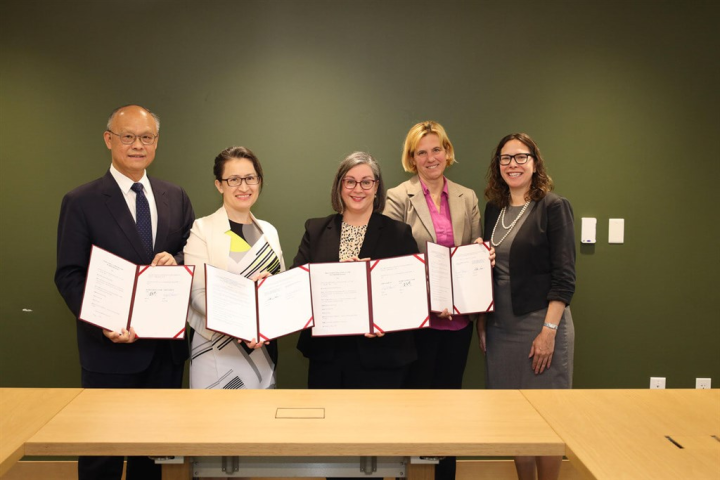
Taipei, June 1 (CNA) Representatives from Taiwan and the United States signed an initial agreement under a larger bilateral trade initiative in the U.S. on Thursday, the Office of Trade Negotiations in Taipei said in a press release.
The new agreement was signed at a ceremony held at the American Institute in Taiwan's (AIT) Washington headquarters, one year after the U.S.-Taiwan Initiative on 21st Century Trade was launched by the two countries, according to the release.
Taiwan's top trade negotiator John Deng (鄧振中), who also attended the ceremony, was cited as describing the agreement as "a milestone" in trade and economic relations between Taiwan and the U.S.
Deng said the new deal (English/Chinese) would strengthen the ability of Taiwan's companies, particularly small and medium-sized enterprises (SMEs), to engage in international trade and investment activities, according to the release. (Note: the Office of Trade Negotiations released a list of revised wording in Chinese that will be used in the agreement on May 30).
Deng added that he believed the deals will also provide more opportunities for Taiwan to take part in regional trade blocs, such as the Comprehensive and Progressive Agreement for Trans-Pacific Partnership (CPTPP), and embark on trade talks with other countries.
The new agreement does not cover tariff reductions or exemptions, but instead outlines practices and procedures aimed at streamlining and strengthening bilateral trade relations.
Under the deal, both sides are committed to working to facilitate bilateral trade and investment flows, improve regulatory practices, promote anti-corruption measures, minimize unnecessary border formalities and encourage the development of SMEs.
The deal also stipulates the establishment of a "foundation" allowing both sides to address trade and investment challenges and opportunities over time.
In practice, the trade negotiations office said in May that under the agreement, both sides will use a digital declaration and risk assessment system to facilitate trade and that goods meeting certain criteria, such as products with a short shelf life, will be allowed to clear customs on arrival.
In the area of regulatory practices, the agreement requires both sides to improve coordination, including digitization of paperwork and taking into account the potential impact on SMEs when devising regulations, the office said.
These measures are expected to benefit communications companies, medical equipment manufacturers and pharmaceutical companies, all of which are subject to strict regulatory standards, according to the office.
In another area, anti-corruption practices, the agreement stipulates that Taiwan and the U.S. introduce guidelines on preventing and combating corruption in all areas affecting trade and investment, the office said.
These measures, the office estimated, will benefit exporters, contractors that have undertaken projects overseas, and private companies that engage in business with government agencies.
As for measures related to SMEs, the office said that, based on the deal, both sides will share their best practices at promoting the development of SMEs, such as financial support and training projects.
The agreement was signed by Taiwan's envoy to the U.S. Hsiao Bi-khim (蕭美琴) and Ingrid D. Larson, managing director of the AIT's Washington office, in the presence of Deputy U.S. Trade Representative Sarah Bianchi.
According to the trade negotiations office, the hope is that the agreement will be expanded after further negotiations to include other topics mandated in the initiative, such as agriculture, standards, digital trade, labor, environment, state-owned enterprises and nonmarket policies and practices.
In Thursday's press release, Deng said future talks will focus on measures to promote fair market competition, enhance transparency, bring down business transaction costs, and further facilitate SME development. He also expressed hope that the new agreement will pave the way for negotiations on a free trade agreement between Taiwan and the U.S.
However, the office has yet to announce when those future negotiations will be held.
Meanwhile, the Presidential Office issued a separate press release quoting President Tsai Ing-wen (蔡英文) as saying that Taiwan had taken "a major stride" in its endeavor to negotiate trade deals with its major trading partners.
Tsai also expressed hope that Taiwan and the U.S. will foster stronger partnerships that boost the economic and industrial growth of Taiwan.